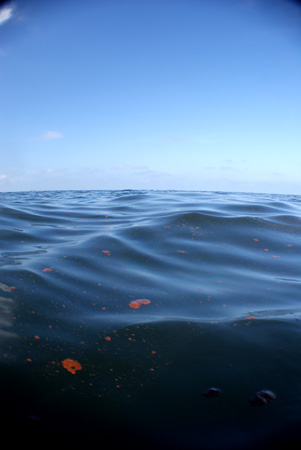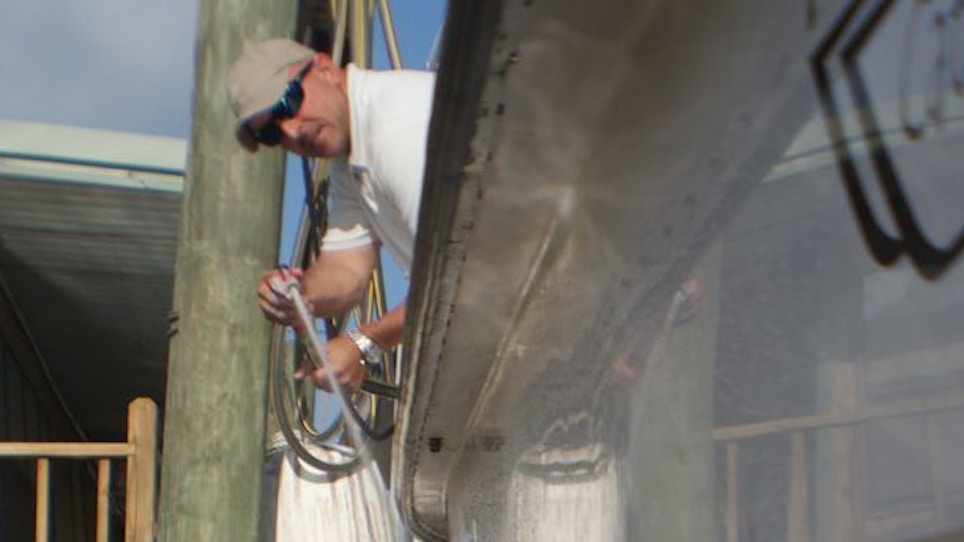 Captain Damon McKnight knows a little about fishing. He sits on the Louisiana recreational seat of the NMFS Gulf Council, and he’s been chief guide of Super Strike Charters for the last fifteen years. As he squints through the glare off the bow of his Twin Vee, he taps the helm with impatience. Today, instead of taking a boat full of anglers out of Venice Marina to chase yellow fin tuna and dorado, he’s taking a cadre of scientists and media out in search of a growing oil slick. Captain McKnight’s impatience is easily forgiven: his lifestyle and livelihood are at stake.
Captain Damon McKnight knows a little about fishing. He sits on the Louisiana recreational seat of the NMFS Gulf Council, and he’s been chief guide of Super Strike Charters for the last fifteen years. As he squints through the glare off the bow of his Twin Vee, he taps the helm with impatience. Today, instead of taking a boat full of anglers out of Venice Marina to chase yellow fin tuna and dorado, he’s taking a cadre of scientists and media out in search of a growing oil slick. Captain McKnight’s impatience is easily forgiven: his lifestyle and livelihood are at stake.
The Deepwater Horizon sunk fifty some odd miles south of Super Strike’s home port of Venice on April 20, 2010. At first, the incident appeared a minor blip. But as the seriousness of the spill rose from an initial estimate of 1000 barrels per day to 5000 barrels per day, locals began to understand the scope of the catastrophe looming on their horizon.
“At first, we thought BP had this under control and it would just burn itself out,” Captain McKnight explains. “But as reports of the size of the spill began to grow, the up and down emotions kicked it and folks started to get nervous.”
The nervousness Captain McKnight describes is understandable.
“We really don’t know what’s going on out there,” he says “but BP has definitely been slacking in clean-up efforts.”
The clean-up efforts Captain McKnight alludes to are an operation that looks like they will take years, not months—which was the originally projected timeframe. And now, after three weeks without a solution to end the flow of thousands of barrels of oil into the Gulf, it looks like the Herculean effort required will not only be in Louisiana, but Texas, Mississippi, Alabama, and Florida too. What we are facing as citizens of the Gulf of Mexico is a major wake up call to reflect on safety precautions and policies regulating the offshore drilling industry. The Deepwater Horizon accident appears to be a complete breakdown of system failures, which lead to an unfortunate loss of eleven lives and a serious blow to the fishing community of the Gulf. The trouble with the Deepwater Horizon lay in the fact we may never know what happened out there and how so many redundant safety systems catastrophically failed. What we do know is the economic danger this places the Louisiana fishermen in.
“You know, we survived Katrina,” the captain begins. “But...”
He trails off as we move into a thick layer of orangish-red coagulated oil. You can see the concern on his face as he plops onto his leaning post. His shoulders hunch as he removes his cap to wipe beads of sweat off his forehead. He stares over the gunnel at the oil quickly collecting on his immaculately kept boat. As he stares at the shimmering, rainbow streaked water he sums the disaster up with a few choice words for BP:
“Fisheries were all ready getting tougher and tougher, but we were fixing them,” he says, “But this is different. BP is definitely responsible and the community is angry.”
“So what does this mean for Louisiana’s fishing economy?” I ask.
He stares over my shoulder at a massive drilling rig encompassed by a heavy slick.
“You can’t put a value on these things. People have to put entire lives on hold, like buying a new home or getting married, because we don’t know how this will play out.”
Check out the newest video update from Captain Shuler.






